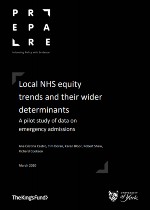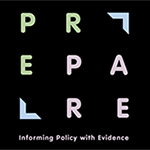
![]()

Our reports
These reports summarise fast turnaround, responsive projects on a variety of topics, using the most appropriate feasible methods, given time constraints.
Read our completed reports:
Adult ADHD assessments and diagnosis

Attention deficit hyperactivity disorder (ADHD) is suspected to affect 3–4% of adults in the UK, although there is no definitive national data on prevalence. The vast majority are undiagnosed and in recent years various sources have highlighted significant waits for adult ADHD assessments that in many places extend over multiple years. There are also concerns that the length of wait for an ADHD assessment is growing as more people present with symptoms. In this report we explore what data is available, collected and used to plan and manage adult NHS ADHD assessment services locally. While this is a narrow scope, having an accurate understanding of the data is a vital first step to understanding where improvements might be made.
- Read the Adult ADHD assessments and diagnosis (PDF
 , 632kb) report.
, 632kb) report.
Place-based partnerships: challenges and opportunities
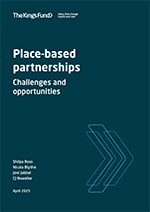
There is little information available nationally about place-based partnerships – how they are set up, what they do, what resources they have, and what factors facilitate or impede their progress. In this report, we explore what progress has been made by systems in arrangements for place-based partnerships, and what impact those arrangements have had, to inform future planning and support.
Exploring Health and Social Care perspectives on the implementation of ‘Right Care, Right Person’, under the National Partnership Agreement

This rapid research project explores the views of health and care staff on the impact of implementing ‘Right Care, Right Person’ (RCRP), a policy designed to ‘end the inappropriate and avoidable involvement of police in responding to incidents involving people with mental health needs.’ Based on in-depth interviews with stakeholders in health and social care services across six geographical areas, we report the experiences, hopes and concerns of those tasked with executing this policy change.
Read Exploring Health and Social Care perspectives (PDF ![]() , 1,486kb)
, 1,486kb)
Measuring prevalence of foetal alcohol spectrum disorder in the UK: a scoping study
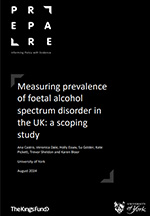
Drinking during pregnancy can affect the developing foetus, risking Foetal Alcohol Spectrum Disorder (FASD). This preventable condition can result in physical, mental, and behavioural problems for children, affecting their life chances and societal costs. The UK has high rates of alcohol consumption, binge-drinking and prenatal alcohol exposure. There are currently no reliable estimates of the prevalence, incidence or cost impact of FASD in England. We reviewed published literature and convened an expert roundtable to make recommendations about how best to estimate the UK prevalence of FASD.
Read Measuring prevalence of foetal alcohol spectrum disorder (PDF ![]() , 1,244kb)
, 1,244kb)
Commissioning community champions: lessons from a pandemic
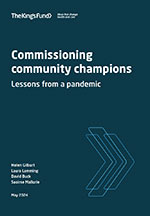
Community champions are typically members of the community who volunteer to promote health and wellbeing or improve conditions in their local community. During the COVID-19 pandemic national funding supported the expansion of community champions programmes across England.
This research explores the model of community champions through the experience of commissioners during COVID-19, captures key features of the approach and highlights how commissioners can make the most of community champions in local systems.
Hospital discharge funds: experiences in winter 2022–23
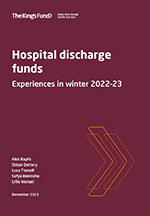
This report explores how six areas experienced additional ring-fenced funding to reduce delayed hospital discharges. Its purpose is to feedback to the Department of Health and Social Care on how the process of providing the funds impacts on local systems and how it could be improved. It also has insights for local health and care systems on how they work together to reduce delays.
Independent Care (Education) and Treatment Reviews
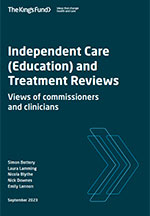
Introduced in November 2019, Independent Care (Education) and Treatment Reviews (IC(E)TRs) are meetings intended to improve the treatment of people with a learning disability or autistic people in long-term segregation.
In this research we spoke with 10 NHS commissioners and seven clinicians who had been involved in IC(E)TR meetings to find out what they thought of the meetings’ planning, running on the day and recommendations.
Dying well at home: commissioning quality end-of-life care
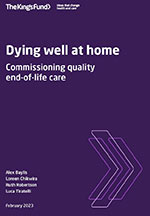
Increasingly, people are now dying at home rather than in hospital and this trend is set to continue. But are there the right staff with the right skills to support people in their home at the end of life, and is the health and care system prepared for changing levels of demand? Dying well at home: commissioning quality end-of-life care presents the findings of research undertaken by The King’s Fund into what information is available on the quality of, and population needs for, end-of-life care at home at a local level, and how that information is used by commissioners.
Informing prioritisation of the backlog for elective surgery: summary of a scoping review
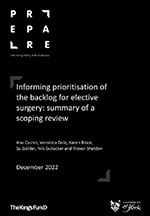
In order to inform policy and practice on prioritising waiting lists, we conducted a scoping review of existing literature to identify research evidence on the effects of waiting for healthcare. Rather than attempting to synthesise a wide-ranging and diverse body of literature, we created an interactive spreadsheet which enables exploration of the impact of waiting for specific conditions and/or treatments.
Read Informing prioritisation of the backlog for elective surgery (PDF ![]() , 1,130kb)
, 1,130kb)
Explore our interactive spreadsheet showing the impact of waiting for healthcare
Strategies to reduce waiting times for elective care
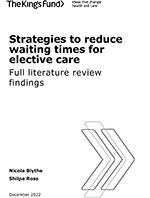
In the face of record high waiting times for elective care, The King’s Fund undertook research commissioned by the Department of Health and Social Care to understand the strategies that have been used to reduce waiting times in England and elsewhere in the past 20 years. This document covers the full findings of the literature review and accompanies the report ‘Strategies to reduce waiting times for elective care’
Exploring gender differences in uptake of GP partnership roles
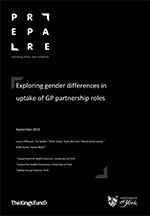
A recent independent review found that women GPs on average earn over 33 per cent less than men, which is the largest gender pay gap in medicine. Even taking account of differences in hours, age, grade and experience, a 15 per cent gender pay gap remains. Women take on partnerships (more senior GP roles associated with higher income) at a lower rate than men, which may explain some of the pay gap. In this mixed methods project, we explore gender differences in uptake of and attitudes to the partnership role.
Read Exploring gender differences in uptake of GP partnership roles (PDF ![]() , 1,657kb)
, 1,657kb)
Building capacity and capability for improvement in adult social care
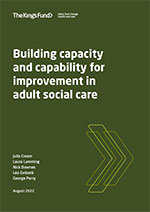
The Department of Health and Social Care wish to understand the experience of sector-led improvement in adult social care to date and how those experiences might feed into a discussion about what is needed to move improvement work forward. Our report doesn’t provide fixed answers, and nor is it a formal evaluation of sector-led improvement, but it does encourage the adult social care sector to think deliberately about what comes next for sector-led improvement.
Childcare providers' experience of the Nursery Milk Scheme for England and Wales: A qualitative study
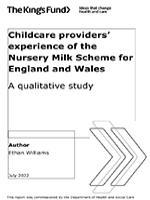
The Nursery Milk Scheme (NMS) is a government-funded scheme operating in England and Wales that allows childcare settings to reclaim the cost of providing one-third of a pint of milk each day to children under five who attend their setting for at least two hours per day. This report, commissioned by the Department of Health and Social Care, draws on interviews with 20 childcare settings to explore how a range of childcare settings use and experience the scheme. Topics covered include how settings sourced their NMS milk, their reasons for sourcing it in this way and their overall satisfaction with the scheme.
Feast or famine: Barriers and solutions to deploying one-year funding for the Universal Grant and Inpatient Detoxification

Following Dame Carol Black’s independent review of drugs, the UK Government announced £80m of one-year funding to improve harm reduction and criminal justice provision, and to support inpatient detoxification in England. This report, commissioned by the Department of Health and Social Care, draws on 60 interviews with commissioners, providers, and Public Health England representatives to provide a detailed analysis of the first quarter in which funding was available. Prominent themes include: the treatment context prior to the arrival of additional funding; plans to deploy the funding; barriers to implementation (prominently including national shortages of skilled staff); identified solutions; the challenges of one-year fixed-term funding; and the sustainability of initiatives should one-year funding end.
Read the Feast or Famine (PDF ![]() , 1,955kb) report
, 1,955kb) report
Integrating additional roles into primary care networks
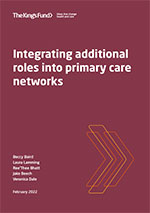
The Additional Roles Reimbursement Scheme (ARRS) was introduced in England in 2019 with the aim of supporting the recruitment of 26,000 additional staff into general practice. While primary care networks (PCNs) have swiftly recruited to these roles, how well are they being implemented and integrated into primary care teams? This report explores how ARRS roles are being embedded within general practice, focusing on the experience of staff working within these roles and the people managing them. The authors highlight a number of factors that are having an impact on how well the roles are being implemented and integrated, including a lack of shared understanding about the purpose or potential contribution of the roles, combined with an overall ambiguity about what multidisciplinary working would mean for GPs.
Women’s priorities for women’s health: a focus group study
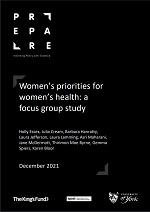
As part of a national Call for Evidence, PREPARE researchers conducted focus groups, enabling the voices of a diverse group of women to be heard and revealing what they want to be incorporated into the emerging Women’s Health Strategy for England.
Read the summary: Women's Priorities for Women's Health - summary (PDF ![]() , 927kb)
, 927kb)
Read the report: Women's Priorities for Women's Health: a focus group study (PDF ![]() , 2,500kb)
, 2,500kb)
Analysis of the economic impact of the NIHR's open access policy

UK Research and Innovation (UKRI) is proposing a policy that all publications based upon research funded by the UKRI and its constituent councils should be available open access. This report, commissioned by the Department of Health and Social Care, is a rapid analysis to estimate the potential costs and benefits of the National Institute for Health Research (NIHR) open access policy proposals.
Read Analysis of the economic impact of the NIHR's open access policy (PDF ![]() , 938kb)
, 938kb)
Understanding trends in use of abortion services in England: an exploratory briefing
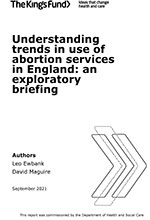
Abortion services have been legally accessible in England since 1968, and since then rates of use have fluctuated. This report, commissioned by the Department of Health and Social Care, explores a range of factors which may be influencing contemporary trends in use of termination services, including economic factors, developments in social attitudes, changes in sexual behaviours, and utilisation of contraceptive and other health services.
Read Understanding trends in use of abortion services in England (PDF ![]() , 1,198kb)
, 1,198kb)
Improving drug treatment services in England
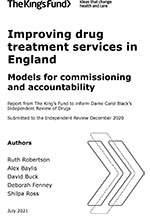
This report was commissioned to inform Dame Carol Black’s independent review of drugs. It reviews models of commissioning, funding and accountability in order to provide insight for Dame Carol’s recommendations on the future of substance misuse services in England.
Read Improving drug treatment services in England (PDF ![]() , 1,175kb)
, 1,175kb)
NHS dental charges and the effect of increases on access: an exploration

The NHS does not charge patients for GP visits or hospital care, but since the 1950s, adults have been charged for treatment by NHS dentists. From 2015 onwards, these charges have increased by five per cent a year. In this report, we explore whether these increases have affected access to NHS dental care.
Read NHS dental charges and the effect of increases on access an exploration (PDF ![]() , 1,978kb)
, 1,978kb)
Qualitative assessment of the impact of the Standardised Packaging of Tobacco and Tobacco and Related Products Regulations on small businesses
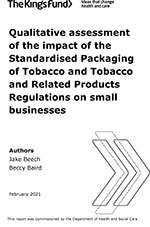
In 2015 and 2016, the Government introduced the Standardised Packaging of Tobacco (SPoT) and Tobacco and Related Products Regulations (TRPR) legislation. These introduced a number of changes that affect the sale of tobacco and related products like e-cigarettes. The changes made include the introduction of standardised tobacco packaging, limits on cigarette pack size, larger health warnings, a ban on characterising flavours in cigarettes, and changes to e-cigarette products and packaging.
When the government introduces legislation which affects businesses, the Department for Health and Social care is required to conduct a review to assess the impact. To support this review, The King’s Fund was commissioned to carry out qualitative research to explore the impact of these regulations on small businesses’
Read Qualitative assessment of the impact of the Standardised Packaging of Tobacco... (PDF ![]() , 330kb)
, 330kb)
Understanding clinical decision-making at the interface of the Mental Health Act (1983) and the Mental Capacity Act (2005)
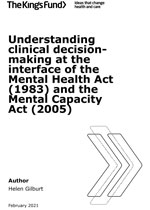
The Mental Health Act (1983) (MHA) and the Mental Capacity Act (2005) (MCA) both provide a legal means by which people can be deprived of their liberty and admitted to hospital on a formal basis when they lack capacity to consent to their admission and treatment.
A key interface of the MHA and the MCA arises where an individual lacks the capacity to decide whether to be admitted to hospital to receive care and treatment, and are not objecting to admission or treatment, then the decision of which Act to use for these purposes is that of professionals involved.
Evaluating the Care and Support Specialised Housing (CASSH) programme: results of a scoping exercise
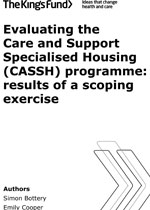
The Care and Support Specialised Housing Fund (CASSH) is a Department of Health and Social Care programme to ‘support and accelerate the development of specialist affordable housing which meets the needs of older people and adults with disabilities or mental health problems’.
The programme provides capital funding to build new specialised housing in England for older people and disabled adults with care and support needs. This brief project is a scoping exercise to consider issues relating to a potential evaluation of the CASSH programme.
Read Evaluating the Care and Support Specialised Housing (CASSH) Programme (PDF ![]() , 446kb)
, 446kb)
Estimating the Economic Value of NIHR Biomedical Research Centres and Units
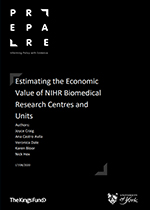
Estimating the Economic Value of NIHR Biomedical Research Centres and Units
Since their establishment in 2007, Biomedical Research Centres (BRCs) have received over £1.4 billion from the National Institute of Health Research (NIHR). In this report, we assess the value for money of this investment, including estimates of additional private sector funding, benefits to local economies and the health benefits which may be associated with BRC discoveries.
Estimating the Economic Value of NIHR Biomedical Research Centres and Units (PDF ![]() , 3,268kb)
, 3,268kb)
Local NHS equity trends and their wider determinants: A pilot study of data on emergency admissions
People living in deprived neighbourhoods are more likely to have an emergency stay in hospital that could potentially have been avoided had high-quality care outside hospital been available. NHS England produces local health and care equity improvement indicators based on deprivation-related inequality in these potentially avoidable emergency admissions.
This pilot study explores trends in these indicators, alongside changes in local public expenditure and local economic conditions, to learn lessons for health and care system quality improvement.
Read (Summary) Local NHS equity trends and their wider determinants (Summary) (PDF ![]() , 689kb)
, 689kb)
Read (Full report) Local NHS equity trends and their wider determinants (Full report) (PDF ![]() , 2,877kb)
, 2,877kb)
Health and Care Services for People Sleeping Rough
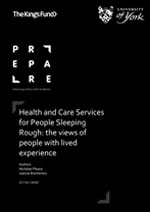
Rough sleeping and health problems can be mutually reinforcing, and some people who sleep rough have high and complex health and care needs. Patterns and causes of homelessness, and the intersections between rough sleeping, health and wellbeing, are complex and varied. In this report, following a review of relevant literature, the views of people with lived experience of sleeping rough on accessing health and care services are explored.
Read Health and Care Services for People Sleeping Rough (PDF ![]() , 1,017kb)
, 1,017kb)
The King's Fund have also published a related report.
Read Delivering health and care for people who sleep rough: going above and beyond
Understanding the impact of display ban regulations on small businesses: qualitative research (the King's Fund)
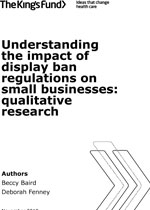
Between 2010 and 2015 the Coalition government introduced legislation banning display of tobacco products in small shops and specialist tobacconists, display of tobacco prices and a ban on sale of nicotine inhaling products (such as vapes or e-cigarettes) to anyone aged under 18 years.
When the government introduces legislation which affects businesses, the Department for Health and Social care is required to conduct a review to assess the impact. To support this review, The King’s Fund was commissioned to carry out qualitative research to understand how the restrictions on displaying packaging and pricing of tobacco products have affected small businesses.
Read Understanding the impact of display ban regulations on small businesses (PDF ![]() , 261kb)
, 261kb)
Women’s experience of gynaecological and urogynaecological services in primary and secondary care (the King's Fund)
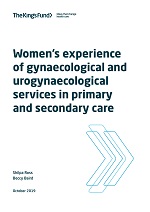
The Department of Health and Social Care commissioned The King’s Fund to undertake a scoping review of the published evidence about women’s experience of health services with a specific focus on gynaecological and urogynaecological services in primary and secondary care.
Read Women’s experience of gynaecological and urogynaecological services (PDF ![]() , 339kb)
, 339kb)
Housing and Technology Capital Fund Scoping
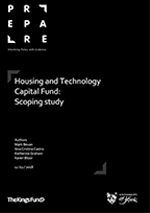
The Department of Health and Social Care (DHSC) and NHS England are supporting partnerships with local housing providers and other stakeholders to develop, remodel and adapt accommodation for people with a learning disability, autism or both. This includes a substantial investment in capital grants to support housing delivery. DHSC commissioned this rapid scoping study to draw learning from the projects during their implementation, to inform future housing and accommodation interventions and to identify and share good practice.
Read Housing and Technology Capital Fund Scoping (PDF ![]() , 1,256kb)
, 1,256kb)
Understanding drivers of litigation in health services
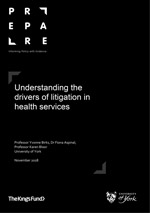
Current systems for seeking compensation are widely considered to be costly and protracted. Costs to the NHS are rising, but it is important to note that only a small proportion of people who have suffered any form of harm while in receipt of health care choose to pursue litigation. Evidence - mainly from outside the UK - suggests that many factors can sway people’s decisions about whether or not to take legal action.
Read Understanding drivers of litigation in health services (PDF ![]() , 1,548kb)
, 1,548kb)
“Spice” use among offenders supervised in Approved Premises and Community Rehabilitation Companies: a preliminary qualitative study
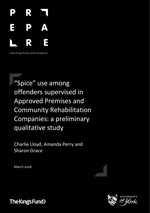
This study provides a rapid, cross-sectional, mainly qualitative exploration of Synthetic Cannabinoid Receptor Agonist (SCRA) use among ex-prisoners being supervised in Approved Premises (APs) and Community Rehabilitation Companies (CRCs). The central question underlying this research was whether the widespread use of SCRAs in prisons - which has been reported by an increasing number of studies, inspections and media articles - is spreading into the community, with consequent implications for community drug treatment. The study was also designed to explore the particular impacts of SCRA use in APs, which as supervised residential facilities, can be seen as ‘semi-carceral’ institutions, with the potential to experience similar problems to prison.
Tackling multiple unhealthy risk factors (the King's Fund)

Since the 2012 King’s Fund report on this issue, the responsibility for many public health services in England, including behaviour change, has been transferred to local authorities as part of the Health and Social Care Act 2012. This has given local authorities an opportunity to reassess behaviour change in the light of their population needs, taking into account The King’s Fund’s work and other research. At the same time, many services have seen their budgets shrink in the face of recent squeezes on public health spending (Buck 2017), and this has motivated public health teams to think differently about how to deliver their services.
Read Tackling multiple unhealthy risk factors - full report (PDF ![]() , 948kb)
, 948kb)
Commissioner perspectives on working with the voluntary, community and social enterprise sector (the King's Fund)
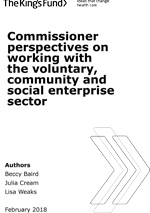
The King’s Fund was commissioned by the Department of Health to conduct research that would explore how and why clinical commissioning groups and local authorities chose to engage with the voluntary, community and social enterprise sector. This report first sets out the methodology we used and then presents our findings on the factors that underpin the adoption of different approaches. We discuss how commissioners’ perceptions of their own strategic role, as well as their views on what role the VCSE sector plays in the local area, appear to exert a strong influence on commissioning decisions.
Read Commissioner perspectives on voluntary, community and social enterprise (PDF ![]() , 231kb)
, 231kb)
Understanding domiciliary care in England
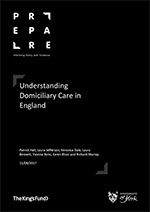
Concerns about the inadequate quantity and quality in supply of home care have been reported by central government and directors of local authority social care departments, as well as managers in acute hospital settings, where access to home care packages is essential for timely discharge of older and disabled patients.
The objectives of our research, and this report, are to better understand the mechanisms of purchasing and delivery of home care, including the current state of supply and demand and key drivers of current market dynamics.
Read Understanding Domiciliary Care In England (PDF ![]() , 1,536kb)
, 1,536kb)
Adult social care local authority commissioning behaviours
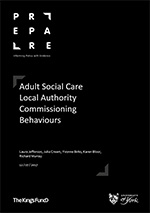
There is a wide variation in the type, amount, quality and cost of adult social care commissioned by local authorities across England.
Some of this variation can be explained by demography and geography, but for many areas, the degree of variation may reflect differences in policy and commissioning approach. This report seeks to better understand what lies behind the variation in fees paid to provide care for people aged over 65 in need of equivalent levels of support, and the role commissioning plays in determining the fee rate paid for local authority purchased care.
Read Adult Social Care Local Authority Commissioning Behaviours (PDF ![]() , 1,352kb)
, 1,352kb)
Amenability of health burdens to digital interventions
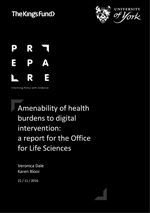
While there is substantial and growing digital activity in the health sector, robust evidence of its benefits to patients and clinicians, and to relieving pressure on the NHS, remains patchy. In this report, commissioned by the Office for Life Sciences, we explore whether areas of high disease burden are amenable to digital (particularly mobile health) interventions.
Read the summary: Amenability of health burdens (Summary) (PDF ![]() , 845kb)
, 845kb)
Read Amenability of health burdens to digital interventions (Full report) (PDF ![]() , 2,223kb)
, 2,223kb)
User feedback in maternity services (the King's Fund)
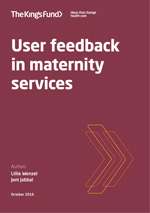
This report draws on evidence from interviews with maternity service providers and non-NHS stakeholders and from a review of relevant literature relating to user feedback and experience. It is based on research commissioned by the Department of Health to explore the benefits of locally developed approaches to collecting and using feedback, with a particular focus on real-time feedback.
Read User feedback in maternity services (PDF ![]() , 976kb)
, 976kb)
Estimating the costs of Female Genital Mutilation services to the NHS
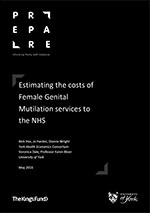
Over recent years, the UK Government has given the issue of female gentital mutilation (FGM) a high priority, both in terms of raising awareness of the illegal and harmful nature of the practice and in considering the extent of health care and other needs for women who have experienced FGM. This report provides an analysis of the current health care landscape for women with FGM as well as an estimate of the costs of treatment of FGM in England and Wales. It also provides some thoughts on data collection and tariff implications for the English NHS Payment by Results mechanism.
Read Estimating the costs of FGM services to the NHS (PDF ![]() , 1,048kb)
, 1,048kb)

